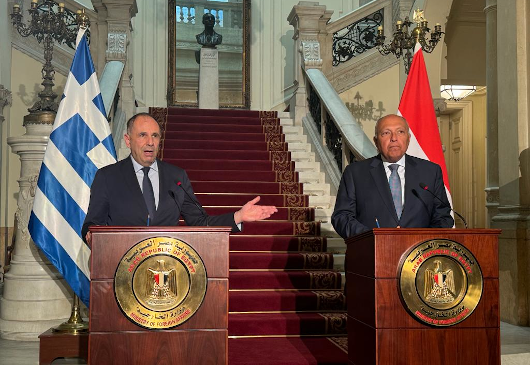
It is my great pleasure and honour to visit Egypt for the third time in my capacity as Minister of Foreign Affairs of Greece. I would like to thank you, Minister Shoukry, and my friend Sameh for the excellent cooperation we have.
We have had an extensive talk with President Sisi. His Excellency was constructive in all respects. We had the opportunity to actually confirm that we have a lot in common and we are like-minded countries. Indeed, Greece and Egypt have so many things in common, which allow us to be very optimistic about our common future and cooperation. Thank you for your generous welcome.
Our strategic cooperation is rooted in the historical ties of our nations. We are both pillars of stability in our volatile region. We do share a common understanding and we are both determined to tackle the multidimensional challenges of our era and our region. The same goes with Cyprus, with which we have a very solid trilateral cooperation.
With Minister Shoukry, we discussed our bilateral ties and how we can make them even stronger. The electricity interconnector between Greece and Egypt, which has been approved by the European Commission as a project of mutual interest, signals the ties between the two states and nations, alongside our cooperation in a variety of fields, such as trade, culture, and tourism.
And, of course, we will continue supporting liaisons between Egypt and the European Union. I will have the opportunity to welcome Minister Shoukry as Foreign Minister of one of the oldest EU member states at the Foreign Affairs Council in Brussels next Monday, in the context of the EU Egypt Association Council.
Understandably, the main reason for my visit today is the situation in the Middle East. We both try to promote peace and stability in the region. We do understand that it is a very fragile situation, and we need to act promptly.
Greece is profoundly concerned about the alarming situation in Gaza and the growing tension in the West Bank, the possibility of a crisis spillover in Lebanon and the Red Sea.
Especially with regards to the Red Sea, I would like to point out that Greece, as the top ship-owning nation in the world, and Egypt, controlling the geostrategic link between the Mediterranean and the Red Sea, do have a common interest in promoting stability in the broader region.
And Greece, as a reliable strategic ally of the Arab nations and especially of Egypt, does everything in its power to prevent an escalation and find a solution to this acute problem.
To this end, I traveled in the region and have discussed it with all parties. I have been in constant communication with Minister Shoukry, with whom I work closely to coordinate our action.
We praise Cairo’s initiatives to find solutions, propose a sustainable and resilient plan to solve the humanitarian crisis, and set up a sustainable situation for the day after.
Indeed, the humanitarian situation in Gaza and the high number of fatalities call for immediate action.
Greece has been one of the first countries to send humanitarian aid to Gaza. And we will do this also in the future.
Yesterday’s news regarding the agreement reached for more medicine and humanitarian aid to be delivered to the civilians in Gaza is a good first step, but it is not enough.
We need to take further and immediate steps to include the provision of basic goods for those in need, as well as essential facilities for the local population.
We must ensure that no displacement takes place and that people may live in their respective homelands in peace and prosperity without the fear of aggression and terrorism.
For that purpose, there must be an overall detailed plan based on the UN Security Council resolutions on the two-state solution. We will jointly work hard towards this direction.
Honourable Minister, given the current uncertainty, I strongly believe that Greece-Egypt bilateral political and economic cooperation, along with our shared vision for regional peace, growth, and prosperity, should serve as an example for other nations.
Minister Shoukry, Dear Sameh,
I thank you again for your warm hospitality here in Egypt.
JOURNALIST: Mr. Gerapetritis, we saw yesterday that a Greek-owned tanker came under attack in the Red Sea; it seems like similar attacks by the Houthi group are taking place. Are you worried about the situation in the Red Sea and what should be done by the Western allies in order to protect the region?
G.GERAPETRITIS: We are concerned about the situation overall. We are very concerned about the spillover effect in southern Israel and Lebanon in the West Bank and, of course, the Red Sea. Especially the Red Sea, there is an increasing concern because it clearly affects the security and safety of maritime navigation, which is of paramount importance for international trade. As you know, there is a task force already in place in order to prevent any hostilities and attacks against the commercial fleet, which are unacceptable and go against the international law of the seas. And this is why we have to be very vigilant. Obviously, we do not support any sort of aggression and hostility. We need to establish a channel of dialogue in order to prevent all these violations of international law alongside our allies and especially with Egypt, which is the main stakeholder because of the Suez Canal corridor.
We have to work together because we all realize what the consequences, not only the humanitarian but also the financial consequences, could be in case there is a strong spillover triggered in the Red Sea. And this would affect not only the region but the globe overall. So, what I think is that we need to have a very strong alliance of nations to discuss the situation. As you know, there has been a UN Security Council resolution in this respect. We need to make sure that navigation is unprohibited and global trade secure.
January 17, 2024


